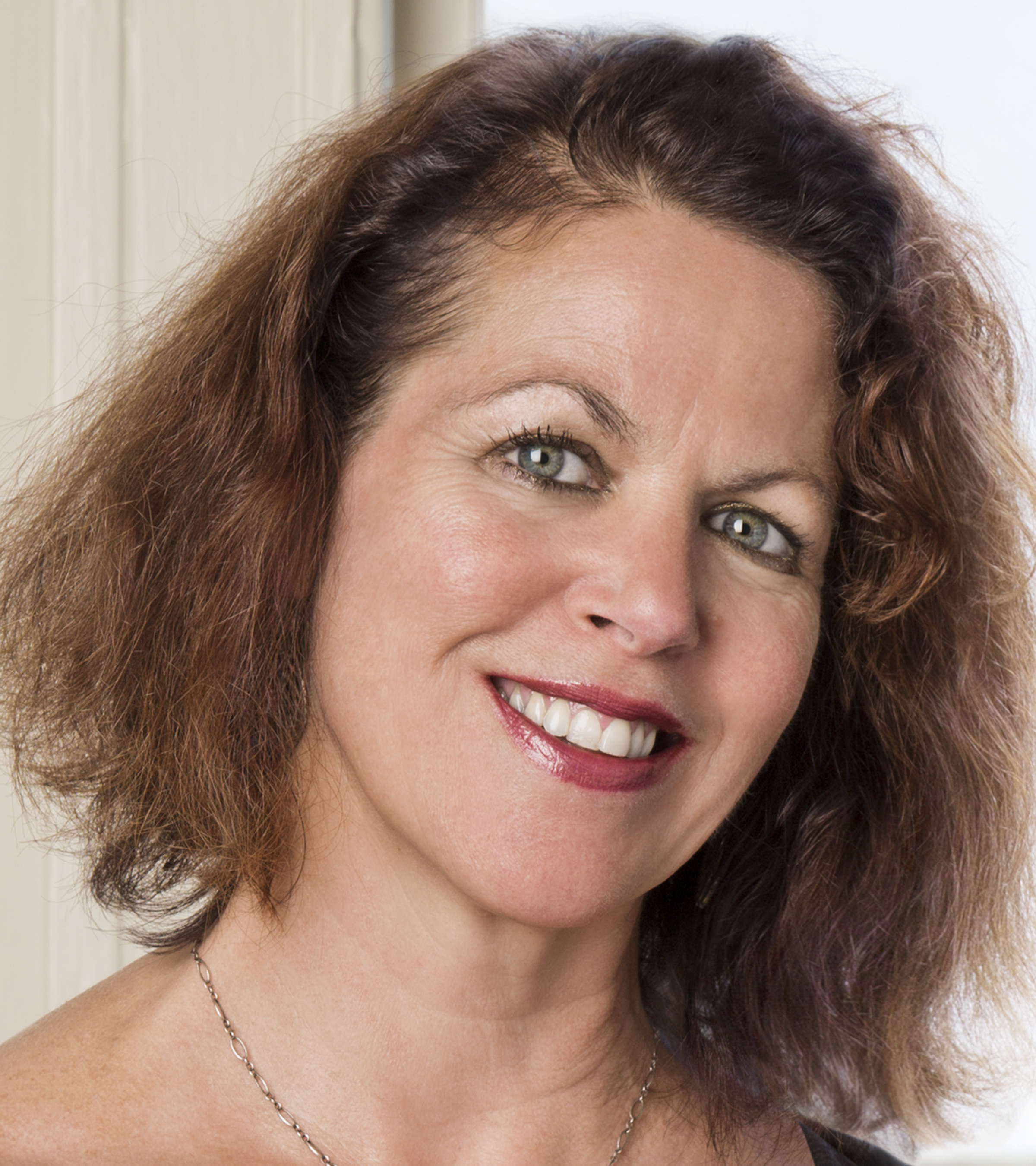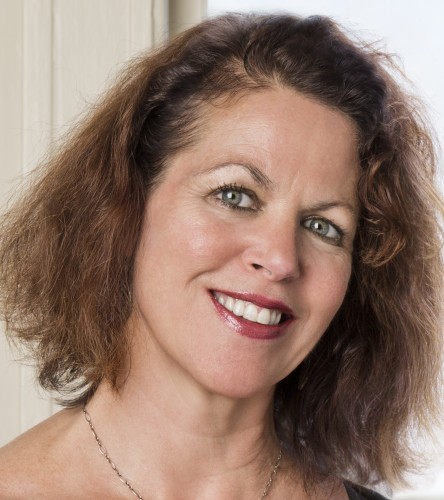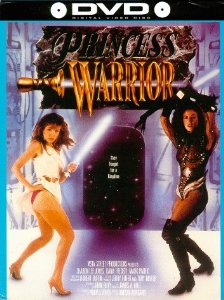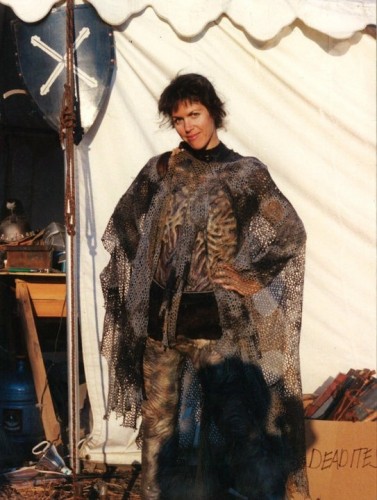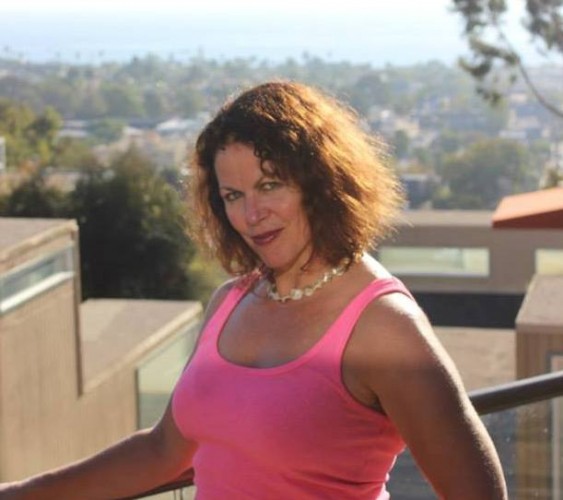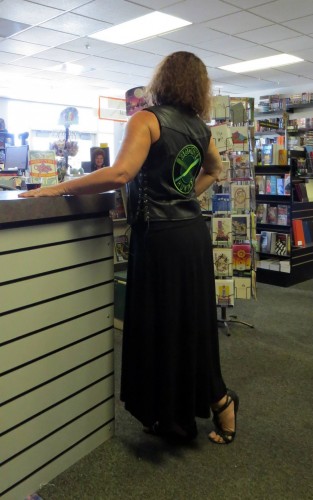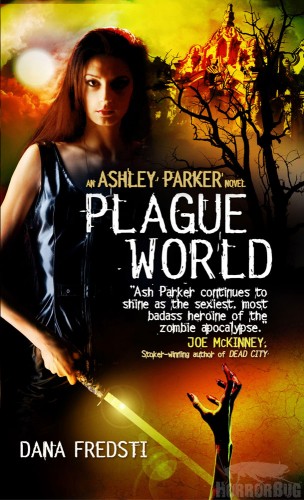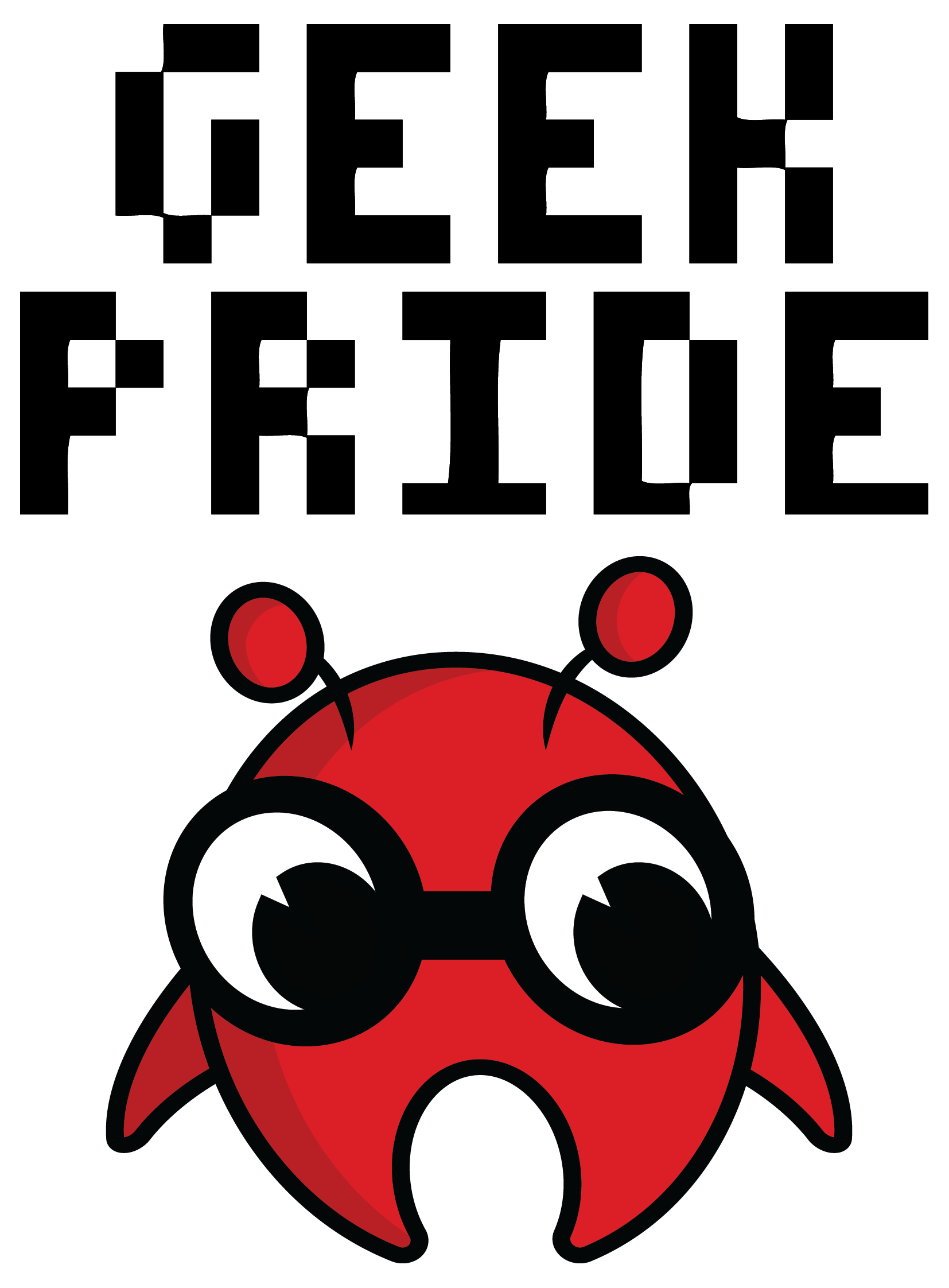Dana Fredsti is the author of the Ashley Parker trilogy, which recently concluded with Plague World (reviewed here). However, long before she became known as a horror writer, she was also an actress, theatrical sword fighter and later a writer of erotic thrillers (under the pseudonym of Inara LaVey).
During her acting career, Dana appeared in Sam Raimi’s Army of Darkness, and whilst long-standing Evil Dead fans were unimpressed with the comedic moments, it was bloody funny (literally) and eminently quotable (“This is my boom-stick!”). This was not merely a background part for Dana, as she was one of the few Deadite sword-fighters (which reminds me to say nice things about her).
One of the more infamous films that Dana starred in was Princess Warrior. For those interested, the film can now be found on Amazon or Ebay at prices higher than the total amount of money that Dana made working on it (the princely sum of $25 a day). Dana has since written about her experiences in her essay, The Skeleton Wore Fishnets.
Plague World is the third novel in Dana Fredsti’s Ashley Parker trilogy. Described as “Buffy, but with zombies instead of vampires”, the series is packed with humour and geek references alongside the horror and zombies. When a book opens with a quote from Big Trouble in Little China, you know you are in for a ride.
So without further ado (and remembering that she stabs people with swords): Ladies and Gentlemen, I present Dana Fredsti.
When did you first begin writing?
As soon as I was old enough to string words together. My first story, written before I hit five years, was The End of the Sun. It had a beginning, middle and an end, so obviously I had an instinctual understanding of plot structure at a very early age. I can still recite it. *clearing throat*:
“One day the sun came out. The next day the sun did not come out. It was the end of the sun.”
How do you balance a strong vein of humour with gut-wrenching horror in your Ashley Parker novels?
I find it very difficult to write without humor in any genre. I think I’ve only written one published story that was devoid of humor and it was not easy to write, although I love the finished product. Writing in first person also brings out my humor in both the narrative and the dialogue because I have an admittedly snarky inner voice talking to me a lot of the time.
As for horror, I’ve always loved being scared and grew up on Hammer films and the original Dark Shadows soap opera (which, to a first grader, was extremely scary at the time), along with Moona Lisa’s hosted sci-fi and horror movies on the weekends. I’ve always thought that well placed humor underscores horrific events, and vice versa. It’s fun to relieve tension with a joke, only to have something horrible happen shortly thereafter.
In the acknowledgements to Plague Town, you reference Buffy the Vampire Slayer as being a source of inspiration for the series, but what else influenced Ashley Parker?
The character of Ashley definitely was, to some degree, influenced by my own sense of humor and physical skill set, as well as my personal ethics. I also like strong female characters, ones that manage to be strong and kick-ass without losing their sense of humor or having to necessarily carry a huge chip on their shoulder or pack a lot of personal baggage.
One of these references includes Sam Raimi’s Army of Darkness, which you were involved in – could you tell me more about that?
I was involved in two separate areas: on-set armourer’s assistant and sword-fighting Deadite/sword captain. I got the first position because Brian, the on-set armourer, was my then-fiancé and he needed an assistant. I had the necessary skills to do the job and had quite a bit of fun “distressing” plastic armour (which means making it look real and like it’s actually been worn as opposed to upsetting it) and helping the various extras get armored up. Brian handled the “hero” armour (the real stuff) and helping the actors don the various pieces/parts. We both did a lot of repairs – replacing leather straps and buckles, repainting, etc.
I got the job as Deadite/Sword Captain because I was training with Dan Speaker and Jan Bryant at the Academy of Theatrical Combat, and they were the fight choreographers for the film.
When it came time for the Deadite scenes to be shot, I switched over to sword-fighting Deadite, and also helped train groups of extras in the very basics of swordplay. I spent a lot of time working on fight choreography with my various fight partners, and then filming.
During the fight between Evil Sheila and Ash, I killed the same soldier over and over again as part of the background fighting. I also did a few hours as a background extra in King Arthur’s village, and was a lighting stand-in for Sheila in the kiss scene in the barn. And no, I did not kiss Bruce Campbell.
There wasn’t any actual makeup involved in our Deadite costumes, at least not the “A” Deadites. “A” Deadites wore full body latex suits and masks, so all skin was covered up. That was then topped with armor (carefully distressed to look like it’d been in the grave for a while) and costume pieces. “B” Deadites wore partial suits, and “C” Deadites wore what were basically skeleton Halloween costumes. If you saw Deadites that looked kind of chunky, those were the stuntmen. The rest of us who came from the Academy of Theatrical Combat were mostly female (I dieted down for this!) or very thin males.
What inspired you to add a quote from Big Trouble in Little China at the start of each novel?
When I first started writing Plague Town, Egg Shen’s quote “But that’s how it always begins, very small” just popped into my head, so I wrote it down. I thought about opening Plague Nation with a quote from a different movie, but decided to stick with Big Trouble for all three of them.
By Plague World, Ashley Parker is an established character within the series, how did you find new ways to develop her character?
I didn’t actively look for ways to develop her. She pretty much evolved as I was writing, just by taking what seemed like the natural progression for someone with her background who then goes through these horrific events and trials by fire, so to speak. What would she do? How would she react? Would she grow stronger or weaker? More sympathetic/empathetic or develop a hard shell? Stuff that I was going through in my personal life also snuck in there in terms of creating a darker side of Ash than I’d originally intended.
You add a unique alternative to the walking dead in the series. Could you explain how you came up with this gruesome idea?
If you’re talking about the Half Deaders, I wanted something to create the equivalent of a ‘vampire with a soul’ since the original pitch I was given was Buffy with zombies. And since I had wild cards, which are fully immune, I thought it would be fun to have another possible reaction to the zombie virus; that being the need to eat human flesh in order to avoid dying and becoming an actual zombie. Moral dilemma time!
How much of the series was planned and did it ever deviate?
I had all three books basically outlined (short outlines with lots of room for growth), but the timeline I’d originally planned (the trilogy was supposed to span a year or two) shrunk down to a few months so some stuff didn’t make it into the books because they wouldn’t fit within the shorter passage of time for the events. I didn’t plan on killing certain characters at all either. And the biker gang was going to have a much smaller part originally and now they’re part of the book’s climax.
How did writing Plague World compare to other novels in the trilogy?
Plague Nation was difficult because I had ‘second book syndrome’ but Plague World was an uphill battle all the way until I got to the last few chapters, and then I couldn’t stop writing. I had a lot of things going on personally and professionally (day job professionally) last year that made focusing on Plague World very difficult, and I also just didn’t know how I was going to wrap everything up. I had a few things mapped out, but it really didn’t come together until I wrote it. I really hope I never have that much difficulty writing a book again, that’s for damn sure.
Plague World is darker in tone than previous Ashley Parker novels – was this intentional or something that happened during the writing process?
I was in a very dark place for a while last year. I used to think suicide was incredibly selfish, but that’s because I’d never experienced a time where the amount of emotional pain I was in outweighed my ability to cope with it. I didn’t – and wouldn’t – do it because my biggest fear is who would take care of my cats if I died suddenly, and… well, I found a hidden cache of strength to draw from. Because of all of this, I was able to take Plague World in a darker direction and I think the choices I made for my characters were stronger because of it. I don’t think I would have been able to kill certain characters or put Ashley through the emotional/mental/physical pain I did had I not been in a pretty dark place myself and gained new perspective on which to draw from.
Was there anything removed during the editing process that you wish you had kept in?
My editor and I work closely together and if I really disagree with any of his edits, he generally lets me have my way. And I’ve learned to be able to let go of things if they bog down the pace. I can always use them later!
What do you have planned for the future?
Well, if Titan wants them, I have ideas for more Ashley books and I’m also pitching a new urban fantasy series to them. In the meantime, my fiancé and I are working on a YA Sci-Fi trilogy together that I’m really excited about. I am not allowed to mention any spoilers, however.
My fiancé hates spoilers, which makes it entertaining to write a pitch/outline with him. “Yes, hon, we do have to include the ending in the outline because agents and editors generally don’t take kindly to sell copy in place of outlines.”
Dana Fredsti, thank you very much.


